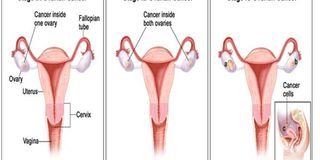New drug raises ovarian cancer survival rates

Ovarian cancer, the third commonest cause of death from gynaecologic tumours in Kenya, is often caught late in six out of every 10 patients, due to lack of specific symptoms, making it difficult to treat. GRAPHIC | NATION
What you need to know:
- Ovarian cancer, the third commonest cause of death from gynaecologic tumours in Kenya, is often caught late in six out of every 10 patients, due to lack of specific symptoms, making it difficult to treat.
- Symptoms include pain in the abdomen or side, bloating or feeling full, constipation, back pain or irregular bleeding. One in five cases are diagnosed at the incurable stage, and end up dying.
A new drug for treating advanced ovarian cancer has shown promising results, raising hope for women suffering from the fifth most common cancer in the world.
During a drug safety trial for the experimental drug ONX-0801 at the Royal Marsden Hospital in London, it dramatically shrunk tumours in half of the patients participating in the trial. Once locked on to a cancer cell, the drug disrupts its chemistry by blocking the action of a key molecule, causing widespread DNA damage and cell death.
“It is rare to see such clear evidence in the early stages of drug development. The beauty of this drug is that it targets ovarian cancer cells, so there are fewer side effects, making it better for treating patients,” said Dr Udai Barneji from the Institute of Cancer Research, who led the study.
ONX-0801 works by mimicking the ability of folic acid to selectively latch onto cancer cells. Because the drug leaves healthy tissue alone, the side effects often associated with traditional chemotherapy such as diarrhoea and hair loss are reduced.
“The next step will be for researchers to test the drug in larger clinical trials to confirm it works and is safe, and to work out which women with ovarian cancer this drug could help. It is hoped the drug could help women who have stopped responding to all other currently available treatments,” he added.
Ovarian cancer, the third commonest cause of death from gynaecologic tumours in Kenya, is often caught late in six out of every 10 patients, due to lack of specific symptoms, making it difficult to treat. Symptoms include pain in the abdomen or side, bloating or feeling full, constipation, back pain or irregular bleeding. One in five cases are diagnosed at the incurable stage, and end up dying.
However, this British study found that ONX-0801 could add up to six months to a patient’s life, thereby suggesting that if administered in the early stages of cancer, survival rates would improve.
The researchers have developed tests that can detect which women are most likely to benefit from the treatment and they plan to carry out larger clinical trials as soon as possible. More research on long-term outcomes is needed before this discovery can be interpreted as a breakthrough.



